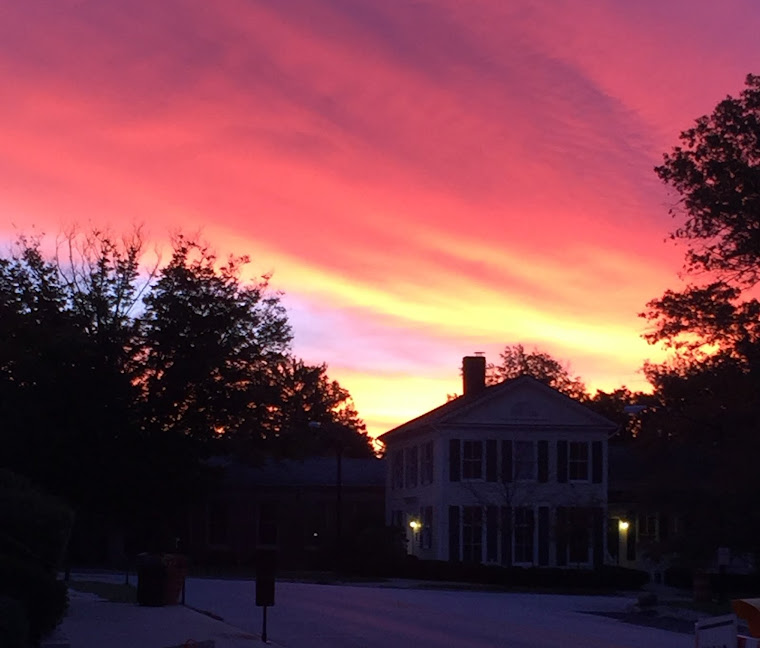1. AOTW: This one is almost entirely self-evident. On Saturdays in the spring/summer/fall, Hudson hosts a farmers' market out in the Green (less than a block from our house). Yesterday morning (9-ish) I walked home from the coffee shop and found that someone had parked entirely across our driveway and had gone over to shop for some farmy food. I was in the act of talking on the phone with the cops when Joyce told me the AOTW had come back--bag full of goodies--and was driving off.
- AOTW News: I think I need a logo for this award--something tasteful but clear. So ... interested? Send me a .jpeg, and I'll use it each week--with your name! (If there's more than one I like, I'll rotate.)
Anyway, we binged some of it but are now watching more slowly: don't want the series to end! The supporting characters are all great, too.
3. I finished two books this week ...
- Ken Bruen's Sanctuary (2009) is in his series about Irish (Galway) "unofficial" cop Jack Taylor (who also had an eponymous series on TV--which we gobbled up). I normally read the Taylors on Kindle, for but some reason this one was not available in electronic format, so I read the actual book.
Taylor narrates the novels (I'm reading them in the order of publication), and this one deals with a series of murders in Galway, a series related to Taylor himself (someone is getting even with him for something he did in an earlier novel). Taylor is in some ways a Lone Wolf: A fallen Catholic, he is a former cop (has intransigently kept the overcoat they gave him), has a severe drinking problem, is a walking textbook on physical injuries (he tends to get hurt ... a lot), and he has no problem Going Vigilante. He is also quite literate--reads all the time (when he's not drunk or recovering from an injury or a binge).
I'll be moving on to the next one this week! (Next is The Devil, 2010.)
- I also finished the new novel by Rachel Kushner (The Mars Room, 2018). I'd not read Kushner before--which is odd: Two of her previous novels (Telex from Cuba, 2008, and The Flamethrowers, 2013) were finalists for the National Book Award. So maybe it's time, eh?
The Mars Room is the name of a strip club/lap dancery where our principal character works--and quite successfully so. Hers has been a troubled life (to say the least): inattentive parents (dad's gone, as I recall), drugs, street life, early sex, etc. She ends up in prison for murder (nuff said), and much of the novel is set there--though Kushner whisks us away from time to time to give us the points of view of other characters--a man who teaches prisoners, her murder victim, etc.
I was, well, dazzled by the structure of this: It appears to hop all over the pond, but every lily-pad ends up being significant.
I liked it so much (though it was hardly an "upper") that I've ordered her first novel and am about to launch into you-know-what.
4. As I posted here a couple of weeks ago, I am blogging on this site less frequently than has been my wont because I'm getting ready to publish Frankenstein Sundae on Kindle Direct. Every time I think it's about ready, I realize it isn't. So ... a couple of more weeks? Then I'll get back to boring you almost every day, not just on Sunday and other other days when a bug bites, and I have to write something.
5. Last Word--a word I liked this week from one of my various online word-of-the-day providers:
- from Oxford English Dictionary--a word that's obsolete, but I want it back!
ingling, adj. Dearly loved, beloved. Also: flattering,
affectionate. [OBSOLETE.]
Origin: Formed within English, by derivation. Etymons: ingle v., -ing suffix1.
Etymology: Apparently < ingle
v. (although this is first attested slightly later) + -ing suffix1
1595 T. Edwards Narcissus in Cephalus & Procris sig. F2
We'le take more ioy in counting ouer sorrowes, Than Venus gazing on her ingling sparrowes.
1598 E. Guilpin Skialetheia sig. A3 Insteede of Ingling termes for thy good will. Reader fall to, reade, iest, and
carpe thy fill.























